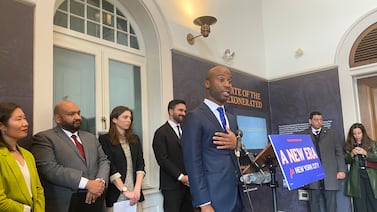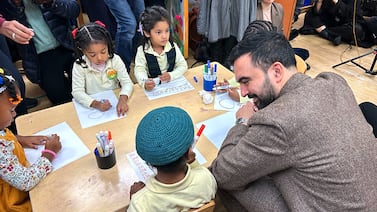Four years ago, education advocate Elizabeth Gore won a surprise victory in the Indianapolis Public Schools board race, defeating two people, including a far better-financed incumbent backed by supporters of school choice.
In the next election, two other challengers who were skeptical of partnerships with charter schools seized board seats, raising the profile of their viewpoints.
But last week’s election dashed critics’ hopes to claim control of the seven-member school board.
Gore and three other candidates supported by the teachers union lost, solidifying board support for dramatic changes in the district, including controversial partnerships with charter schools.
As the dust settles on the contentious battle for control of the district, there is deep disagreement about what to make of the results. Supporters of the four winners say the victories show that voters are happy with the direction of the district. Those who lost the race, however, say that the election came down to money, where they had a significant disadvantage.
The starkest funding gap was in the at-large race where Gore lost to newcomer Kenneth Allen. A Gary native and father of school-age children, Allen raised over $174,000 — the most money for an IPS board seat in recent memory. About 90% came from political action committees that are friendly to school choice.
Even though Gore — who raised about $22,000 primarily from the state teachers union PAC — has seen school board campaigns escalate spending in recent years, the flood of money into the IPS race stunned her.
“I’m speechless,” said Gore, who lost the race by about 2 percentage points. Gore believes that candidates who are skeptical of the direction of the district are so vastly outspent they have little chance of claiming seats.
“When you add it all up,” Gore said, “the power of money at this point is the thing that seems to be working.”
Allen declined an interview request from Chalkbeat, saying that he needed to focus on work and family after the campaign.
About 37% of IPS students now attend innovation schools, which are managed by outside charter or nonprofit operators. Those schools are controversial in part because teachers are not represented by the union and they are not directly controlled by the administration.
Some who backed the winners downplay the role of money. Justin Ohlemiller, executive director of Stand for Children Indiana which runs a PAC that spent at least $140,000 on the race according to the candidate reports, instead credited voters who learned about the issues and then supported the changes in the district.
It takes money to pay for outreach, such as mailers and text messages to voters telling them about candidates. In a race where many voters are not familiar with the candidates or issues, Ohlemiller argues that it is crucial to inform them.
“I don’t buy into the premises that spending has anything to do with the outcome,” Ohlemiller said. “End of the day, voters make decisions. ... That decision should be honored.”
Sashah Robertson, an IPS parent who was on the Stand committee that chose candidates to endorse, didn’t realize how much money was spent on the election. But she dismissed the idea that the seats were bought.
The group worked hard to research and pick candidates to endorse and to tell thousands of parents about their choices, Robertson said. “I just want the best for our kids.”
Incumbent Diane Arnold, who defeated a challenger to win reelection in District 4, said that it takes more than money to win a board seat. During the campaign, she made 500 phone calls and walked over 20 miles going door to door to meet voters and hand out flyers.
Arnold pointed to prior candidates who won despite funding deficits. But she was also surprised at the surge in fundraising this election, and she raised concerns about the “optics” of spending so much on the election.
“I think they probably need to reevaluate what they’re doing and see if it’s too much,” said Arnold, referring RISE Indy, a newly formed PAC funded by national school choice advocates that endorsed Arnold and the other winning candidates.
RISE Indy did not respond to interview requests.
Over the last eight years, the battle for control of IPS has become contentious and politicized, with candidates backed by allies of charter schools facing off against candidates backed by the teachers union.
The ideological split did not dominate either side’s campaign, and campaign literature largely didn’t mention charter schools. Many voters may not have been aware of the ideological debate or what is going on in IPS schools. Others likely voted based on factors like who they trust or who friends recommend.
Shanta Williams chose a candidate who was supported by the union and one backed by charter-friendly PACs. The mother of a high schooler, Williams moved to the district four months ago. When it came time to cast her ballot for school board members, she voted for incumbents — Diane Arnold and Elizabeth Gore — because she heard IPS was getting better.
“I don’t think your common people know anything about innovation schools,” Arnold said.
The vigorous campaigns for board seats help spread information among voters and give them access to information, Arnold said. People “at least have the opportunity to be more informed than in the other surrounding districts.”
Incumbent Venita Moore, who was backed by RISE and Stand, won re-election with 79% of the vote, the most decisive margin in the race. Another RISE-supported candidate, newcomer Will Pritchard, handily won the District 1 seat on the east side.
Moore believes that voters supported her because they see her as independent and sincere, she said. But she also argued that the success of the four candidates who support the current direction of the district shows that “more people are benefiting from the decisions that we’re making than are not.”
All four defeated candidates were backed by the IPS Community Coalition, a group that’s consistently critical of the current administration. Coalition leader Jim Sheurich blamed the loss on outside money that poured in.
In 2018, two coalition-backed candidates won their uphill battle because many voters were angry that the district had recently closed several high schools, Scheurich said.
If IPS closes more schools, as is widely anticipated, “we will be back in the same situation because that’s going to upset a ton of people,” he said.
Christina Smith, who helped found the coalition and ran against Arnold to represent District 4, said supporters of partnerships with charter schools invested heavily in this race because they lost two seats in 2018.
“They realized that if they didn’t step up their game, that they would lose again,” said Smith, an activist and parent. Smith, who lost by about 4 points, said she was encouraged that two races were close despite the fact she and her allies raised significantly less than their opponents.
While the coalition’s candidates were defeated, the fight for control of the district is not over, Smith said.
That’s one thing she and Arnold agree on.






